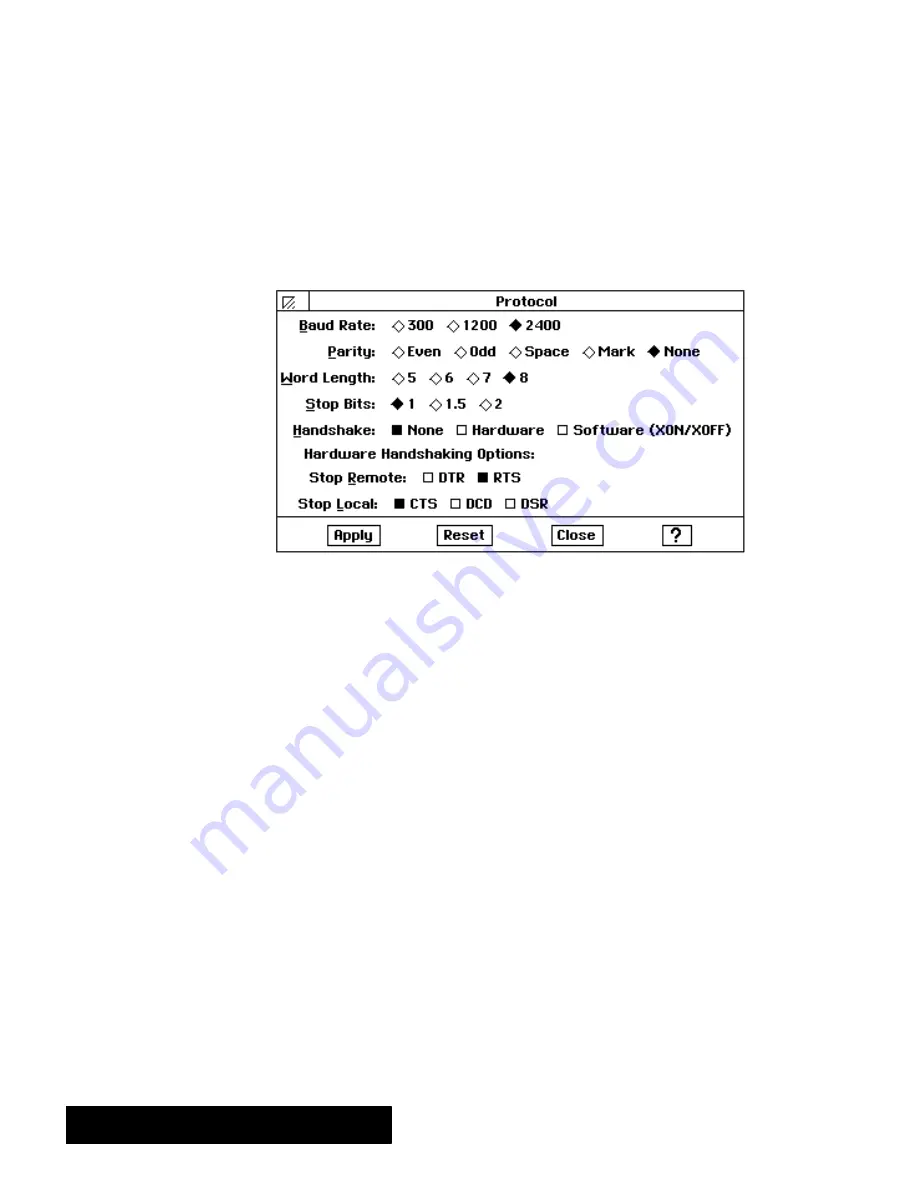
Using a Modem 336
Getting Ready to Communicate
Before you can communicate, you must connect to the other modem by
choosing protocol andterminal settings, andthen dialing. Once you
connect, you can use the Communication window to sendandreceive
messages. Anything you type is sent to the other computer. The messages
sent to you by the other computer also appear in the Communication
window.
Choosing the protocol settings
Protocol
allows orderly exchange of information between two modems.
Protocol settings tell your modem such things as how fast to transmit
information andwhat type of phone line you have. Use the dialog box
above to select the protocol settings for your modem.
Call to findout what protocol settings the other computer is using. Your
protocol settings must match the protocol settings of the computer or
wordprocessor you communicate with.
"
To choose the protocol settings:
1. Choose Protocol from the Options menu. Fill in the following:
S
Baud Rate.
The baudrate is the rate of speedyour modem sends
andreceives information. Select 2400 baud.
S
Parity.
Parity checks errors in sending information. The most
common setting is None.
S
Word Length.
WordLength is the number of bits that form a
character. The most common setting is 8.
S
Stop Bits.
Stop bits help a computer figure out when to sendor
receive a character. The most common setting is 1.
S
Handshake.
Choose Software (XON/XOFF), andEnsemble checks
the flow of information from the other computer or word
processor. Handshake allows you to receive all information sent
to you by the other computer or wordprocessor.
S
Hardware Handshaking Options.
Use the default settings.
You should always turn off call
waiting when using the phone
line to communicate with
another computer. Failure to do
so may cause the other
computer to disconnect if
someone calls while you are
connected. To find out how to
turn off call waiting, consult
your local telephone company.
Summary of Contents for Ensemble PDP-100J
Page 11: ......
Page 71: ...Getting Started 60 Optional Accessories Fax Modem Data Modem Scanner Cut Sheet Feeder ...
Page 72: ......
Page 83: ......
Page 152: ......
Page 217: ...Spreadsheet 203 The following dialog box appears ...
Page 219: ......
Page 262: ......
Page 269: ......
Page 284: ......
Page 301: ......
Page 306: ...Calculator 287 Cut and paste Handling Error or Overflow Conditions To clear an error ...
Page 308: ...Calculator 289 Converting Measurements S S S S S S To convert ...
Page 312: ......
Page 325: ......
Page 327: ...Book Reader 306 To close a book Using Information and Text To read a book ...
Page 330: ......
Page 333: ......
Page 337: ...Text File Editor 314 ...
Page 338: ......
Page 345: ......
Page 349: ...Scanner 324 What to do if an error occurs Error Condition Message Solution ...
Page 350: ......
Page 379: ......
Page 387: ...Appendix 360 Color Clip Art SNOWMAN TEA TIGER TURTLECA WANDFLOW WATERLIL ...
Page 396: ...Appendix 369 Print Functions Function Description Example ...
Page 405: ...Appendix 378 Fonts Occidental Font Symbols keyboard International keyboard Math Symbols ...
Page 406: ...Appendix 379 Ping Pong Font Pointer keyboard Numbers keyboard Symbols keyboard Other Symbols ...
Page 407: ...Appendix 380 Shattuck Avenue Font Symbols keyboard International keyboard Math Symbols ...
Page 408: ...Appendix 381 URW Mono Font Symbols keyboard International keyboard Math Symbols ...
Page 409: ...Appendix 382 URW Roman Font Symbols keyboard International keyboard Math Symbols ...
Page 410: ...Appendix 383 URW Sans Font Symbols keyboard International keyboard Math Symbols ...
Page 414: ......
Page 418: ...Glossary 390 ...
Page 420: ...Glossary 392 0 1 1 1 ...
Page 421: ...Glossary 393 text style sheet ...
Page 422: ...Glossary 394 ...
Page 423: ......
Page 428: ...Index 399 D cont d 1 0 1 1 1 1 0 1 0 1 1 0 2 1 0 0 0 1 0 ...
Page 430: ...Index 401 F cont d 1 1 0 0 1 0 0 0 0 0 0 0 0 0 G 1 0 1 ...
Page 436: ...Index 407 S cont d 1 3 3 1 1 0 1 4 0 3 0 0 1 1 3 1 3 1 0 1 1 1 0 1 3 1 0 1 2 ...
Page 440: ......






























